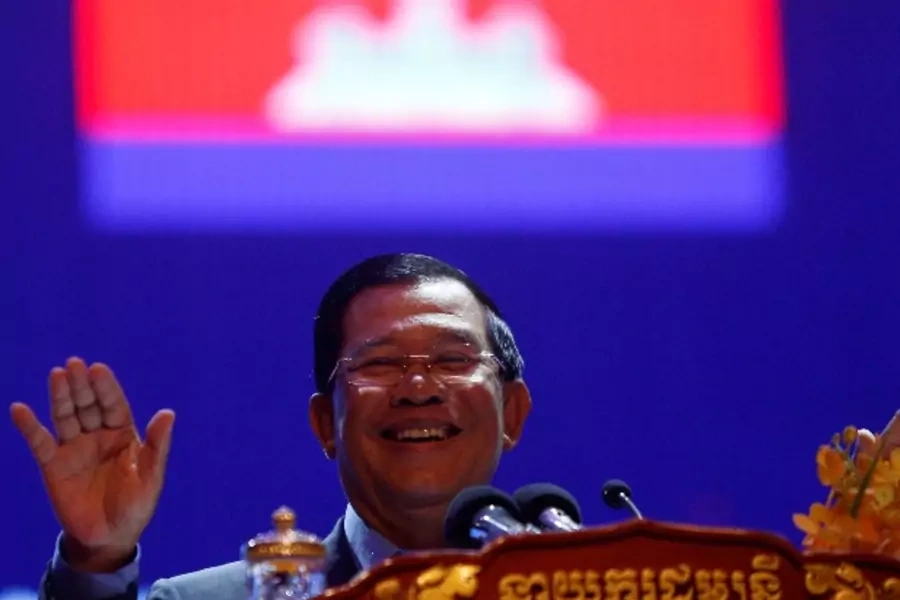Cambodia’s Turn Toward Authoritarianism (Again)

Over the past year, any hopes that Cambodia, where national elections almost led to a change in government three years ago, was headed toward a democratic transition, have been fully dashed. Prime Minister Hun Sen and the ruling Cambodian People’s Party (CPP) are again taking complete control of the kingdom. In fact, as the country prepares for the next national elections, to be held in 2018, Hun Sen appears to be resorting to his usual combination of repressing opposition politicians and co-opting a small number of his opponents. These harsh but skillful tactics have helped him become the longest-serving non-royal ruler in Asia, surviving one of the most tumultuous political environments in the world.
To review – following national elections in 2013 in which the new opposition coalition, the Cambodia National Rescue Party (CNRP), did much better than expected, Hun Sen appeared unusually subdued. He publicly acknowledged a need for more inclusive politics and he publicly welcomed opposition leaders into parliament. The opposition coalition had relied on support from younger Cambodians who, in many cases, no longer remembered the Khmer Rouge era and longed for better government than that provided by Hun Sen. Perhaps shocked by nearly being beaten by the opposition in 2013, Hun Sen promised a new “culture of dialogue” with the opposition CNRP. Many CNRP leaders took their seats in parliament and prepared for Cambodia to potentially grow into a stable, two-party system. Opposition leader Sam Rainsy, who had been living in exile, returned to Cambodia.
More on:
That compromise has come completely unraveled, with the government using all its tools to crack down on the CNRP. Rainsy has fled into exile again after the government produced a warrant for his arrest on old, questionable charges. The government has arrested four human rights workers and an election commission official as part of an elaborate investigation into an alleged affair by top CNRP leader Kem Sokha. It also has detained at least twenty-five opposition politicians on a range of charges, while police have raided the opposition coalition’s headquarters.
This crackdown may have economic repercussions as well. As Markus Karbaum notes on New Mandala, Hun Sen’s tight control of politics, combined with a lack of transparency and high levels of graft throughout the economy, are dissuading foreign investors. The country has few comparative advantages over neighboring nations like Vietnam, and its rice sector and garment sector, which are critical to the economy, are facing serious troubles. Rice is becoming too costly to produce, due in part to poor physical infrastructure. The garment industry will shrink if Cambodia loses its priority access to the EU market, which is possible in the next decade or so.
Strangely, Rainsy does not seem as alarmed as the situation might warrant. In an interview with Radio Free Asia during a recent visit to Washington, Rainsy was muted in his criticism of Hun Sen. Rainsy further maintained that the opposition continues to “value and hail the culture of dialogue” even as it is battered by the CPP.
Hun Sen’s crackdown is part of a regional trend. After being challenged in the early 2010s, anti-democratic forces are getting stronger in many parts of Southeast Asia. In Malaysia, where a 2013 election nearly put the opposition coalition in power, the opposition is in tatters and fighting amongst itself. Former prime minister Mahathir Mohamad has attempted to take the opposition reins, but he is still widely distrusted by many urban and liberal Malaysians. With the opposition split, and the Najib government aggressively pursuing prosecutions of politicians and civil society activists under sedition laws, even the massive 1MDB state fund scandal does not seem to have stopped Najib’s consolidation of power. Although in the long-term, young and urban support for the ruling coalition is waning, Najib’s coalition just won two parliamentary by-elections and looks poised to dominate national elections, which must be held before August of 2018. Given the opposition’s lack of coherent leadership, and the ruling coalition’s two by-election victories, it is highly possible that Najib will call elections in 2017 instead.
Similarly, in Thailand the military junta increasingly shows few signs of giving way. Asked this week whether he would step down if the Thai public votes, in August, against the junta-backed new constitution – as Prime Minister David Cameron offered his resignation following the Brexit vote – Thai Prime Minister Prayuth Chan-ocha was blunt. “Do you want me to leave or what? I’m not leaving,” even if the junta-backed constitution is voted down in the national referendum, Prayuth told reporters. “I’m the one who sets the rules.”
More on:
 Online Store
Online Store
